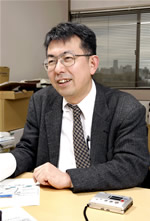2010/05/10
Petaflops-scale supercomputers open up the computational science era
Professor Yutaka Ishikawa
(Department of Computer Science)

“Computational Science” attracts attention as the third pillar of science and technology, along with “experiment and observation” and “theory.” It is the “10 petaflops-scale next-generation supercomputer (peta-scale computer)” that plays an active role in this area by 2012. In order to open up the future of Japan in new fields such as nanotechnology, life science, and drug discovery using this machine, the key is to foster talents who master super high-speed machines that are hundreds times faster than the existing supercomputers, and to develop applications. Professor Ishikawa says “it is essential to succeed in the mega-competition era of peta-scale computer through an industry-academia cooperation in which, by concentrating the wisdom from computational science, engineering, and computer scientists, applications are developed by universities and then provided to industry.” He promotes as his mission the establishment of parallel distributed computing systems that support the creation of a 10 peta-scale computer environment that no one has ever used and the subsequent research of a supercomputer for after the next generation.
Professor Ishikawa played a leadership role in “T2K,” an open supercomputer development joint project of the University of Tokyo, University of Tsukuba, and Kyoto University. Its operation started at these three universities from June 2008 to provide a high-speed performance supercomputer with common specification to users who want to execute large-scale scientific computation. Trainings to master the skills of using a super high-speed performance machine are provided with this open supercomputer to prepare for the computational science era using 10 peta-scale computers that would appear in two years from now. This is Professor Ishikawa' s “design” to make a smooth soft landing towards the peta-scale computer era.
Therefore, he accelerates the schematization of system software that will be the core of parallel distributed systems, and positions dependable systems and cluster grid systems as pillars of research. For example, if a dependable system is developed in a way it does not seem to have failed as a whole even if one node failed, this would make significant contributions to broad fields including OA, home information appliances, service robots, FA, and next-generation mobile phones. Professor Ishikawa supports the peta-scale computer era from the dependable standpoint.